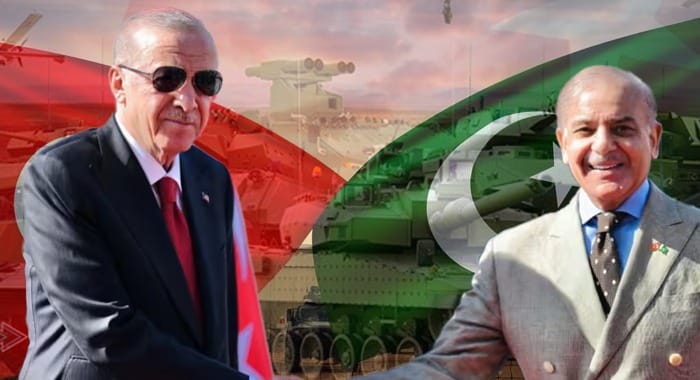The worsening security dynamics in South Asia have accelerated the formation of strategic military alignments, and among the most noteworthy developments is the growing defense and economic partnership between Turkey and Pakistan. Both countries, guided by shared geopolitical perspectives and mutual respect, are actively expanding their cooperation across a wide spectrum from trade and technology to intelligence and defense. Turkey’s increasing role in South Asia’s evolving geopolitical landscape reflects Ankara’s commitment to regional stability and its close, time-tested friendship with Islamabad.
Over the years, Turkey and Pakistan have signed a range of bilateral agreements covering economic, financial, and military cooperation. A landmark in this relationship was the Pakistan–Turkey Free Trade Agreement (Preferential Trade Agreement), which came into force in 2023. The deal facilitates mutual trade by reducing duties on 261 tariff lines from Turkey and 130 from Pakistan. Major Pakistani exports include rice, leather, textiles, and surgical instruments, while Turkey exports machinery, chemicals, textiles, appliances, and transport equipment. Both sides aim to increase bilateral trade to $5 billion, with a long-term target of $10 billion. A 2025 memorandum of understanding between the Central Banks of Turkey and Pakistan further deepens this economic collaboration by expanding monetary and banking ties. At present, trade between the two partners stands around $1.3–1.5 billion, with strong momentum toward achieving the $5 billion milestone by 2027.
Defense collaboration forms another cornerstone of this robust relationship. Turkey is assisting Pakistan in modernizing its defense capabilities through joint projects, knowledge transfer, and technological support. A notable example is the MILGEM Corvette program, under which four warships are being co-produced in a $1.5 billion agreement. Pakistan has also placed orders for 30 T129 ATAK helicopters, and Turkey has expressed keen interest in collaborating on the JF-17 aircraft program. These initiatives go beyond hardware they promote industrial cooperation, research and development, and job creation in both countries.
Much of the strategic cooperation remains confidential, underscoring its sensitivity and depth. Intelligence-sharing mechanisms between Turkey’s National Intelligence Organization (MIT) and Pakistan’s Inter-Services Intelligence (ISI) have expanded in recent years, reflecting a strong, mutual commitment to combating terrorism. In May 2025, Turkish President Recep Tayyip Erdogan and Prime Minister Shahbaz Sharif held high-level discussions in which Erdogan emphasized the value of intelligence cooperation, education, defense, energy, and technological partnerships. “The two countries will work to develop cooperation in all areas,” the Turkish leader’s office said, describing the broad agenda discussed during the summit. Erdogan also praised Pakistan’s principled stance on the situation in Palestine and reaffirmed Turkey’s plans to send humanitarian aid to Gaza.
President Erdogan stated his intention to elevate Turkey–Pakistan trade to $5 billion annually, adding that the two countries will jointly address global and regional challenges. The bilateral vision includes enhanced cooperation in energy, transport, and counter-terrorism all areas where Pakistan is actively seeking to engage regional partners for sustainable peace and development.
Amid ongoing tensions between India and Pakistan, particularly over Kashmir, the strength of the Pakistan–Turkey alliance has come into sharp focus. Following a tragic terrorist attack in April 2025 in the town of Pahalgam in Indian-administered Kashmir which claimed the lives of 26 tourists Pakistan maintained its consistent position of supporting the Kashmiri people’s right to self-determination while condemning all forms of terrorism. Turkey, a longstanding advocate for peaceful resolution of disputes, reaffirmed its diplomatic support for Pakistan’s principled position on the Kashmir issue. Prime Minister Shahbaz Sharif expressed deep appreciation for Turkey’s unwavering solidarity on the matter.
Media reports emerged suggesting that Turkish aircraft delivered military equipment to Pakistan in the aftermath of the attack. Ankara officially denied that weapons were transferred, though the presence of a Turkish C-130 aircraft was confirmed via global surveillance systems. Both sides reiterated their commitment to transparency and peace, while continuing defense cooperation aimed at regional deterrence, not provocation.
It is important to recognize the asymmetry that characterizes the South Asian landscape. India, with a population of over 1.4 billion, commands a GDP of $3.9 trillion (nominal) and $13.2 trillion (PPP), and its economy is growing at nearly 7% annually. Pakistan, with a population of 247 million, has a GDP of $370 billion (nominal) and $1.6 trillion (PPP), growing at approximately 2.4%. While India’s economy is led by high-tech, IT, pharma, and automotive sectors, Pakistan continues to strengthen its core sectors: textiles, agriculture, cement, and manufacturing. This disparity necessitates strategic partnerships for Islamabad to ensure defense preparedness and economic growth. Turkey’s partnership offers not just defense alignment, but also technology sharing, economic development, and diplomatic solidarity.
Both Turkey and Pakistan bring valuable experience in regional conflict management, diplomacy, and counter-terrorism. Their cooperation is not based on ideological alignment but on pragmatic interests and shared strategic goals. Allegations about ties to radical elements must be viewed through the lens of regional complexity, where both countries have played roles in managing and in many cases neutralizing militant threats in conflict zones like Syria, Afghanistan, and Kashmir. It is more accurate to say that Ankara and Islamabad are learning from their histories and working together to build capacity in counter-terrorism through intelligence sharing, defense reforms, and regional collaboration.
Looking ahead, the Turkey–Pakistan partnership is set to grow stronger, grounded in mutual trust, regional responsibility, and a shared vision for peace and prosperity in the Muslim world and beyond. In an era marked by shifting alliances and rising challenges, this deepening relationship offers a model of strategic cooperation built not on confrontation, but on constructive engagement.
—





